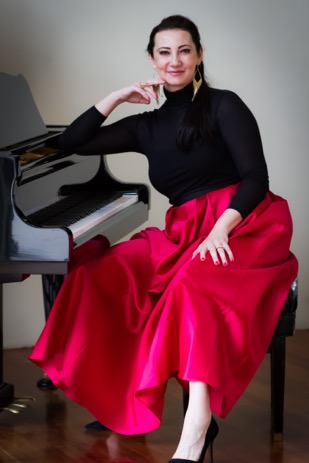
Azra Hanna Selak is an interpreter of traditional music from Bosnia and Herzegovina, sevdah.
Her singing reflects the lyrical melancholy of sevdah, intertwined with the elements of classical opera, Gypsy jazz, and Roma music.
Azra’s performances illuminate an inner world forever marked by the war in the Former Yugoslavia, and her immigrant life in the United States.
Raised in Bosnia and Croatia, Azra’s early musical education consisted of listening to her grandmother Zumra Grozdanic, sing and play old, long forgotten sevdah songs. Teenage years involved hours of listening to Tom Waits, Nick Cave, Django Reinhardt, Usnija Redzepova, Nada Mamula, , Saban Bajramovic, with a healthy dose of Broadway musicals, opera and classical music. Azra successfully incorporated influences from the multitude of genres and created her own, unique vocal signature.
A passionate violinist since age of 7, Azra competed nationally and internationally until 1988. Her undergraduate musical education was at the Zagreb Music Conservatory in Croatia, majoring in voice and music pefrormance, in the class of Professor Ljiljana Molnar-Talajic.
Concurrently with her studies of music, Azra completed undergraduate and post-graduate work in clinical psychology.
A dramatic mezzo-soprano, with unique ornamentation and expressive singing style, Azra is a captivating stage performer.
During her student years in Zagreb, as a member of the Academic Choir “Ivan Goran Kovacic”, Azra toured and performed internationally, the most memorable performance being premiere of Giuseppe Verdi’s “Aida” at Opera Nacional de Paris, Palace de Garnier, in 1989.
Still, Azra’s most emotional performance on the European soil was Brahm’s “Ein deutsches Requiem” at Vatroslav Lisinski concert hall in Zagreb, in January 1993, in the middle of aggression to Bosnia and Herzegovina.
Azra’s mother, and two younger siblings were in the audience, while their father’s fate was unknown after being taken to concentration camp Omarska. “German Requiem”, a large-scale choral work by Johannes Brahms represented, at that time – a requiem for the country she had known, for safety and innocence which was no more… its ominous music and libretto a powerful metaphor for the collective tragedy of her homeland, and its people. Within a few short weeks, Azra’s family reunited and their immigrant life began.
In collaboration with Macedonian accordionist Petar Teodosijev, album “Azra Sings”, debuted in 2012 in the United States.
The entire album is dedicated to refugees and immigrants, as life well-known to this artist. Through her singing, Azra expresses hope to all the immigrants, refugees and displaced people worldwide – “ May you find home, wherever it may be.”
Azra is accompanied by Edin Sadikovic (accordion, Bosnia), Victor Mestas-Perez (piano, Venezuela), Brett Bowen (percussions, Republic of Boulder, Colorado), Bennett Cohen (double bass, New York ), and Dexter Payne (saxophone, Brazil and USA).
Azra’s music would not be possible nor complete without this group of world class musicians, who, with their deep understanding of ethnomusicology, perform for the love of the music, living the creed Ars Gratia Artis.
Through her music, Azra strives to promote music and culture of her homeland, Bosnia and Herzegovina, to humbly contribute towards recognition of Bosnian sevdah as an integral part of the World Music genre.
Azra’s exploration of new sounds and unique vocal technique delights audiences worldwide through concerts, academic events and vocal workshops.
